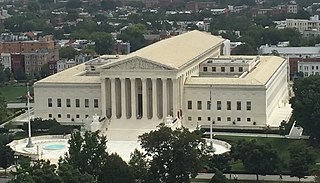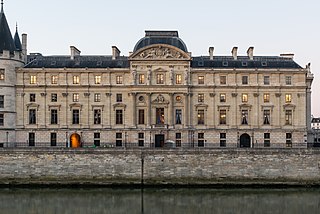
An appellate court, commonly called a court of appeal(s), appeal court, court of second instance or second instance court, is any court of law that is empowered to hear an appeal of a trial court or other lower tribunal. In much of the world, court systems are divided into at least three levels: the trial court, which initially hears cases and reviews evidence and testimony to determine the facts of the case; at least one intermediate appellate court; and a supreme court (or court of last resort) which primarily reviews the decisions of the intermediate courts, often on a discretionary basis. A particular court system's supreme court is its highest appellate court. Appellate courts nationwide can operate under varying rules.
Precedent is a principle or rule established in a legal case that becomes authoritative to a court or other tribunal when deciding subsequent cases with similar legal issues or facts. The legal doctrine stating that courts should follow precedent is called stare decisis.

The Supreme Court of the United States (SCOTUS) is the highest court in the federal judiciary of the United States. It has ultimate appellate jurisdiction over all U.S. federal court cases, and over state court cases that turn on questions of U.S. constitutional or federal law. It also has original jurisdiction over a narrow range of cases, specifically "all Cases affecting Ambassadors, other public Ministers and Consuls, and those in which a State shall be Party." The court holds the power of judicial review: the ability to invalidate a statute for violating a provision of the Constitution. It is also able to strike down presidential directives for violating either the Constitution or statutory law.

Whilst the House of Lords of the United Kingdom is the upper chamber of Parliament and has government ministers, for many centuries it had a judicial function. It functioned as a court of first instance for the trials of peers and for impeachments, and as a court of last resort in the United Kingdom and prior, the Kingdom of Great Britain and the Kingdom of England.
A writ of mandamus is a judicial remedy in the English and American common law system consisting of a court order that commands a government official or entity to perform an act it is legally required to perform as part of its official duties, or to refrain from performing an act the law forbids it from doing. Writs of mandamus are usually used in situations where a government official has failed to act as legally required or has taken a legally prohibited action. They cannot be issued to compel an authority to do something against the law. For example, it cannot be used to force a lower court to take a specific action on applications that have been made, but if the court refuses to rule one way or the other, then a mandamus can be used to order the court to rule on the applications.
In law, certiorari is a court process to seek judicial review of a decision of a lower court or government agency. Certiorari comes from the name of an English prerogative writ, issued by a superior court to direct that the record of the lower court be sent to the superior court for review. The term is Latin for "to be made more certain", and comes from the opening line of such writs, which traditionally began with the Latin words "Certiorari volumus...".
Case law, also used interchangeably with common law, is a law that is based on precedents, that is the judicial decisions from previous cases, rather than law based on constitutions, statutes, or regulations. Case law uses the detailed facts of a legal case that have been resolved by courts or similar tribunals. These past decisions are called "case law", or precedent. Stare decisis—a Latin phrase meaning "let the decision stand"—is the principle by which judges are bound to such past decisions, drawing on established judicial authority to formulate their positions.

The Court of Cassation is the supreme court for civil and criminal cases in France. It is one of the country's four apex courts, along with the Council of State, the Constitutional Council and the Jurisdictional Disputes Tribunal.
A brief is a written legal document used in various legal adversarial systems that is presented to a court arguing why one party to a particular case should prevail. Appellate briefs establishes the legal argument for the party, explaining why the reviewing court should affirm or reverse the lower court's judgment based on legal precedent and citations to the controlling cases or statutory law.

The Welfare Party was an Islamist political party in Turkey. It was founded by Ali Türkmen, Ahmet Tekdal, and Necmettin Erbakan in Ankara in 1983 as heir to two earlier parties, National Order Party (MNP) and National Salvation Party (MSP), which were banned from politics. The RP participated in mayoral elections at that time and won in three cities Konya, Şanlıurfa, and Van. Their vote percentage was approximately 5%.

The Supreme Court (Filipino: Kataas-taasang Hukuman; colloquially referred to as the Korte Suprema, is the highest court in the Philippines. The Supreme Court was established by the Second Philippine Commission on June 11, 1901 through the enactment of its Act No. 136, an Act which abolished the Real Audiencia de Manila, the predecessor of the Supreme Court.

The Supreme People's Court of the People's Republic of China is the highest court of the People's Republic of China. It hears appeals of cases from the high people's courts and is the trial court for cases about matters of national importance. The court lacks judicial independence and has no power beyond what is granted to it by the National People's Congress (NPC).

The Indiana Supreme Court, established by Article 7 of the Indiana Constitution, is the highest judicial authority in the state of Indiana. Located in Indianapolis, the Court's chambers are in the north wing of the Indiana Statehouse.
In law, a majority opinion is a judicial opinion agreed to by more than half of the members of a court. A majority opinion sets forth the decision of the court and an explanation of the rationale behind the court's decision.

The Supreme Court of Cassation is the highest court of appeal or court of last resort in Italy. It has its seat in the Palace of Justice, Rome.

In most legal jurisdictions, a supreme court, also known as a court of last resort, apex court, and highcourt of appeal, is the highest court within the hierarchy of courts. Broadly speaking, the decisions of a supreme court are binding on all other courts in a nation and are not subject to further review by any other court. Supreme courts typically function primarily as appellate courts, hearing appeals from decisions of lower trial courts, or from intermediate-level appellate courts. A Supreme Court can also, in certain circumstances, act as a court of original jurisdiction, however, this is typically limited to constitutional law.

The Supreme Court of the Russian Federation is a court within the judiciary of Russia and the court of last resort in Russian administrative law, civil law and criminal law cases. It also supervises the work of lower courts. Its predecessor is the Supreme Court of the Soviet Union.
The Algiers Accords of January 19, 1981 was a set of obligations and commitments undertaken independently by the United States and Iran to resolve the Iran hostage crisis, brokered by the Algerian government and signed in Algiers on January 19, 1981. The crisis began from the takeover of the American embassy in Tehran on November 4, 1979, where Iranian students took hostage of present American embassy staff. By this accord and its adherence, 52 American citizens were able to leave Iran. With the two countries unable to settle on mutually agreeable terms, particularly for quantitative financial obligations, Algerian mediators proposed an alternative agreement model - one where each country undertook obligations under the accords independently, rather than requiring both countries to mutually adhere to the same terms under a bilateral agreement.
Kiyemba v. Bush (Civil Action No. 05-cv-01509) is a petition for habeas corpus filed on behalf of Jamal Kiyemba, a Ugandan citizen formerly held in extrajudicial detention in the United States' Guantanamo Bay detention camps, in Cuba. Mr. Kiyemba is the next friend of each of the nine Uighur petitioners, Abdusabur, Abdusamad, Abdunasir, Hammad, Hudhaifa, Jalaal, Khalid, Saabir, and Saadiq, who seek the writ of habeas corpus through the petition











